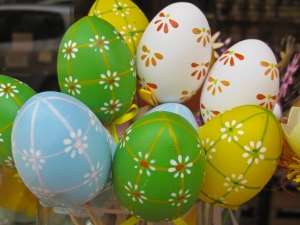The history of Easter is somewhat mired in controversy.
These days it is predominantly a traditional Christian festival marking the anniversary of Jesus’ crucifixion and resurrection. But does it stem from a pagan festival celebrating the Goddess Oestre – goddess of growth and rebirth, or the Jewish Pesach, or a combination of many different beliefs?
Whatever it’s foundations there is general consensus around the theme of rebirth and new beginnings.
So what does this mean for the single folk of London? Is it a time to take stock, relax, indulge in a bit of long-weekend shenanigans and begin afresh on Tuesday?
Well allow me to indulge you with 10 peculiar facts about Easter and let’s see where we go from there.
10) Solving murder mysteries is a popular Easter pastime In Norway. Seriously.
9) 75% of people eat the ears off chocolate bunnies first, 5% eat the feet and 4% the tail.
8) The egg has been considered a symbol of life for thousands of years. The custom of giving eggs can be traced back to the Egyptians, Persians, Gauls and Greeks.
7) Pysanka is the term for Easter egg painting.
6) An old superstition holds that wearing new clothes at Easter means good luck for the rest of the year.
5) While many believe the cross on hot cross buns represents the cross of the crucifix, these baked delights can be traced back to Anglo-Saxon pagans and represent a celebration of the 4 stages of the moon. In English folklore, it was believed a hot cross bun could help cure the ill.
4) Rather than being on a fixed date each year, Easter Sunday is celebrated on the first Sunday after the first full moon after spring equinox. This is because it is the day of the most light. 12 hours daylight and 12 hours moonlight.
3) The Easter bunny stems from the Hare – the symbol of the pagan goddess Oestre. Being the goddess of growth and rebirth implied a certain fertility and rabbits and hares are certainly known for their propensity to breed.
2) London internet users are 7% more likely than the average to visit a travel site during the Easter break.
1) 25% of surveyed children thought that Easter was a celebration of the Easter Bunny’s birthday.
I’m not sure how much this helps but at least you can show off a little specialist knowledge. What you do with how impressed people are is of course up to you. Why not sign up for an event to test it out?
Good luck.
WORDS BY JOHN DAVIS
